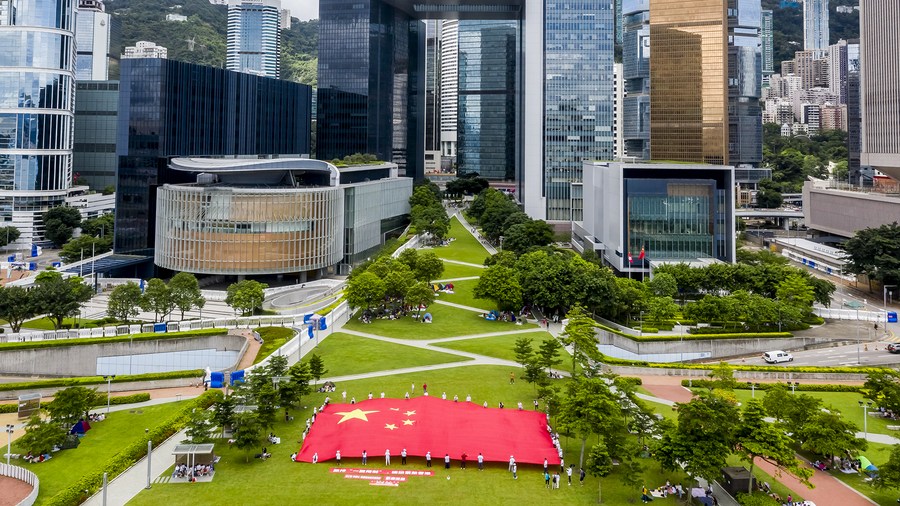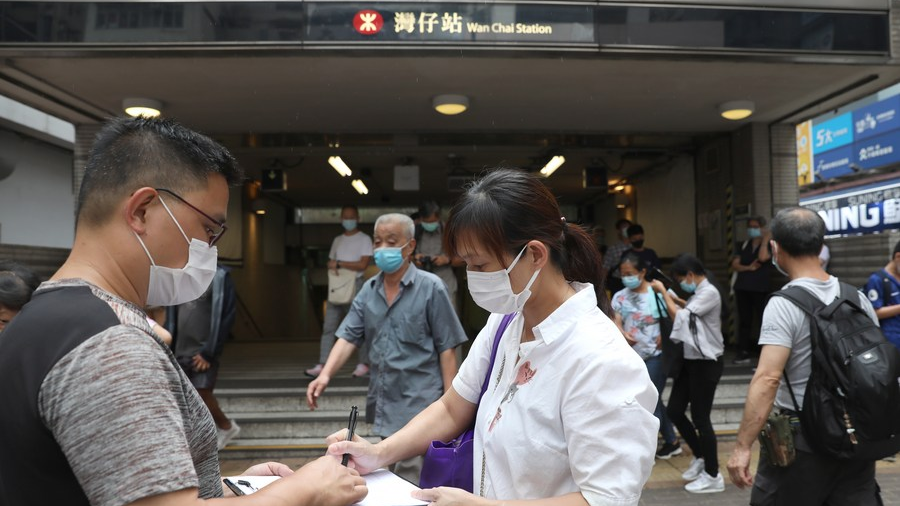
Hong Kong residents display China's national flag in Tamar Park in support of the national security legislation for the HKSAR, Hong Kong, June 25, 2020. /Xinhua
Hong Kong residents display China's national flag in Tamar Park in support of the national security legislation for the HKSAR, Hong Kong, June 25, 2020. /Xinhua
Editor's note: Bobby Naderi is a journalist, guest contributor in print, radio and television, documentary filmmaker and member of the Writers Guild of Great Britain. The article reflects the author's opinion, and not necessarily the views of CGTN.
Superseding China's Constitution, the Basic Law of the Hong Kong Special Administrative Region (HKSAR), and more importantly, public demand, a "supremely confident" U.S. Secretary of State Mike Pompeo says the State Department has imposed visa restrictions on Chinese officials "in retaliation" for allegedly undermining HKSAR's autonomy guaranteed in the 1984 Sino-British Joint Declaration.
The irredeemably flawed and deeply harmful gambit comes after the U.S. Senate's unanimous passage of the Hong Kong Autonomy Act, which also calls for illegal sanctions against any current or former official identified as being responsible for eviscerating the HKSAR's so-called autonomy and freedom from China.
Not deterred by the unwarranted opposition to the Hong Kong National Security Legislation, Beijing slammed Washington for its decision to enact visa restrictions on Chinese officials, and vowed to take strong measures to uphold its sovereignty ahead of national security legislation for the city.
The law is expected to be formally approved by the Standing Committee of the National People's Congress at a three-day meeting which convenes from Sunday.
Until that happens, and it will happen, one should realize that the U.S. government, which is trapped in a cycle of enmity with friends of foes and is committed to cutting budgets for public health services in the pandemic season, doesn't care that much about the people of the HKSAR, let alone their human rights and freedom.
If you wander the web in this Black Lives Matter moment, you will find that Washington as ever is focused more on targeting anti-racism protesters and weaponizing Taiwan than improving human rights at home and abroad.
This desperate gambit to block any opening has to be for domestic consumption and core interests. It's an attempt to interfere in China's internal affairs in great violation of international laws and UN Charter.
More still, Washington's addiction to unpopular sanctions is self-defeating and would yield no results amid a trade war, a pandemic, and a soaring distrust between Washington and the American public.
The same argument could be made about the U.S. Congress allowing Americans to sue China for alleged COVID-19 damages, the Trump administration threatening new tariffs against China, the State Department designating Chinese media organizations as "state propaganda outlets", and jetting Pompeo to Europe on Air Force One for a new "dialogue on China" with the European Union.

A local gives signature in support of the national security legislation for the HKSAR, China, May 23, 2020. /Xinhua
A local gives signature in support of the national security legislation for the HKSAR, China, May 23, 2020. /Xinhua
Lest he forgets, the EU has already warned that Washington's unilateral measures against China could undermine transatlantic unity with inadvertent consequences.
For the sake of argument, when a new challenge emerges, the U.S. and the rest of the West respond together. A case in point could be the Cold War with Russia, and sanctions against the Soviet Union after it invaded Afghanistan in 1979, or in response to Russian advances in Crimea, Eastern Ukraine and Syria.
The strategic conclusion in Washington appears to be that China can similarly be checked via joint pressures and sanctions, something unimaginable today, because China hasn't threatened any country for generations, is a free market economy, and has a vast network of Western traders and partners, not to mention global trading and diplomatic alliances.
Economically and militarily, the current effort of pressing China into capitulation has risks, too. One only has to remember that China, with much less military capacity, successfully withstood U.S. pressure for decades during the Cold War.
What's more, U.S.'s economic dominance in the world has been declining, and China has no intention to conquer the world. Put simply, China is looking for partners and a shared future.
That said, should all truly go well, it will be a good thing for the Chinese central government and the HKSAR authorities to take strong measures to protect national sovereignty, security and development interests.
What they need now is a historic covenant, and that could happen under the Hong Kong National Security Legislation. This would help systemize their dialogue, show long-term commitment in future summits and development programs, and ensure that the National Security Legislation was not a one-off affair.
To this end, all that's needed is to get the grotesque behavior of Team Trump out of the picture to ensure that the HKSAR continues to prosper as a global hub of commerce, all the while protecting China from external forces determined to impinge on its sovereignty and hard-won prosperity.
This is what counts these days as Chinese diplomacy. Such is the nature of what they have all become in Washington.
In the prevailing environment, international media outlets are expected to serve the public much better by focusing on what's really going on behind closed doors – a very systematic two-tiered operation of the HKSAR and Taiwan and the effort by Washington to try to make sure they capture the headlines for all the wrong reasons, that they are top of the news, just to capture their people's attention and distract them from the ongoing anti-racism protests, pandemic and petty shortcomings of the United States.
In light of all this and more, it's hardly surprising that no one with a sound mind in Europe or elsewhere would ever give Trump their nod of approval, fuel his misgivings, and stomach another crisis.
Once in Europe, Pompeo can stipulate that China is a threat and needs to be checked. In reality, the U.S. has few allies and clear goals in Europe and the South China Sea.
In such isolation, Washington's miscalculation is not terribly difficult to understand. The effectiveness of its pivot-to-Asia gambit and China containment strategy is very much in doubt.
In the Trump era and with Europe largely moving off of Washington's radar after it binned so many international treaties and agreements, the geopolitical reality is that the national project for greater cooperation between the Chinese mainland and the HKSAR will only continue to intensify for generations to come.
(If you want to contribute and have specific expertise, please contact us at opinions@cgtn.com.)